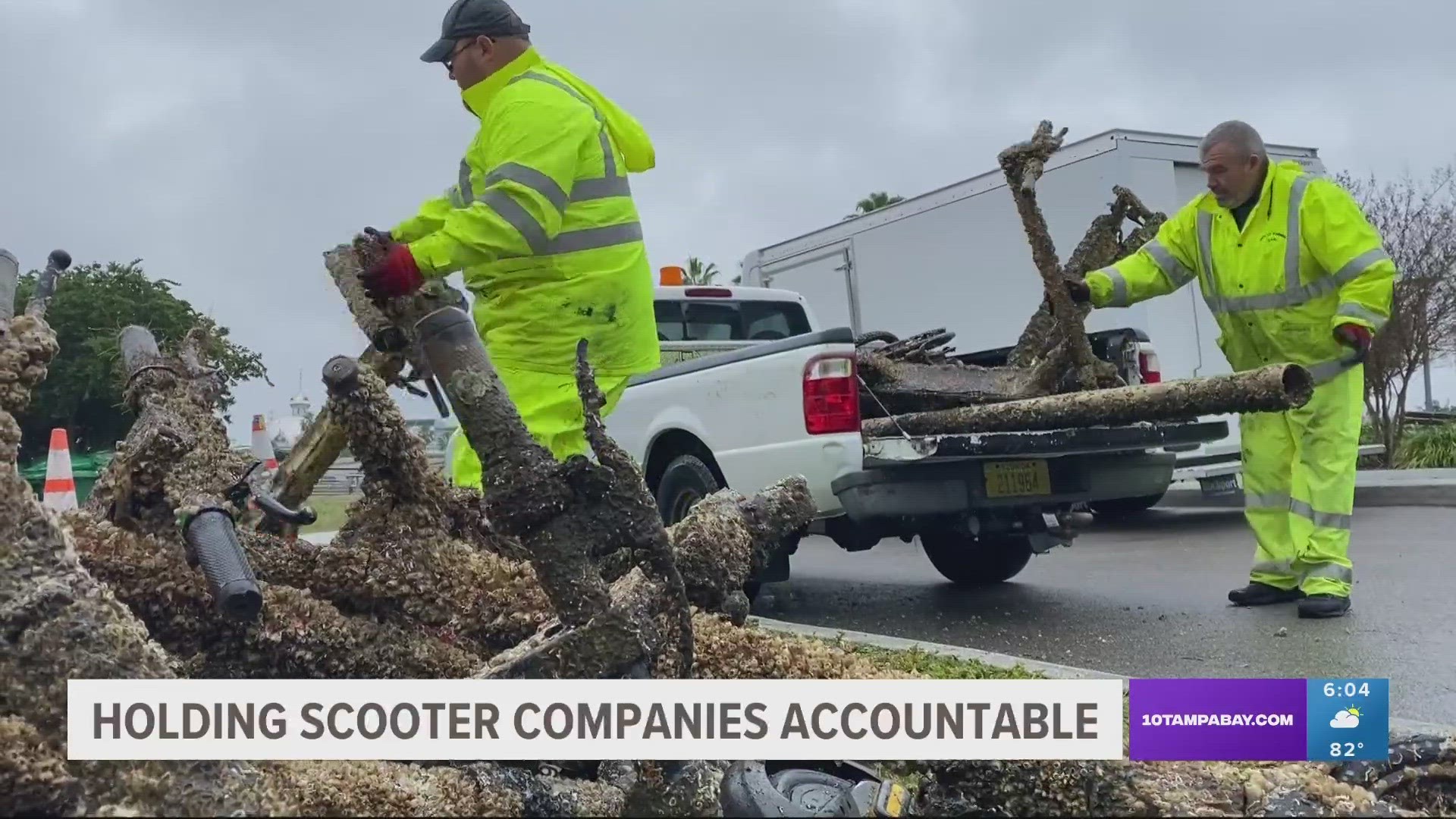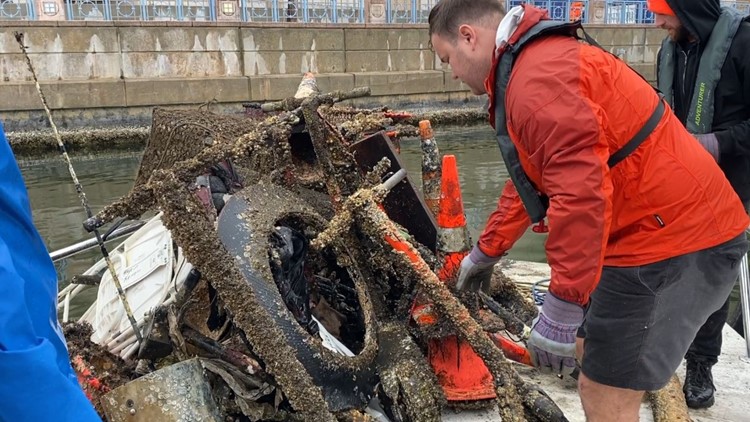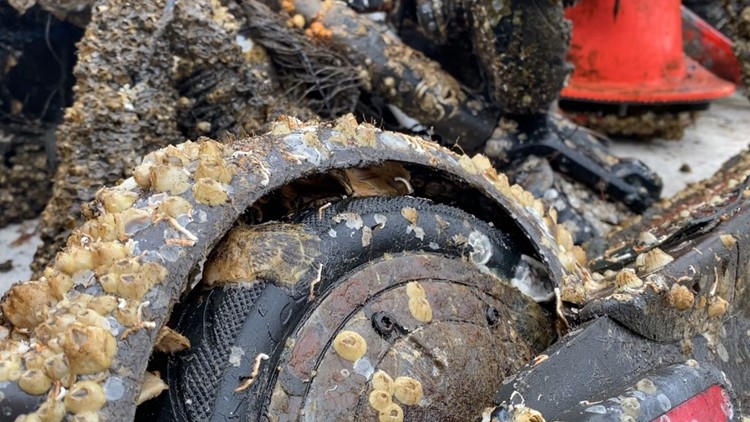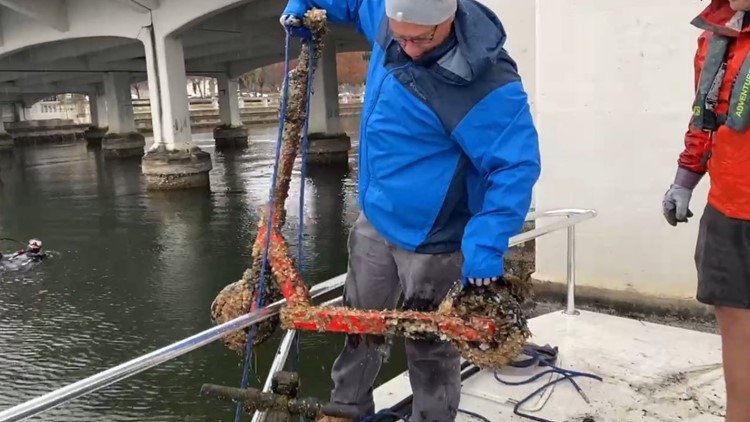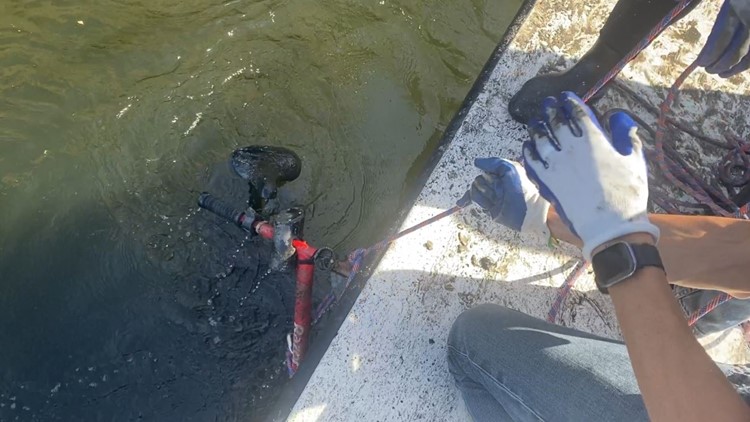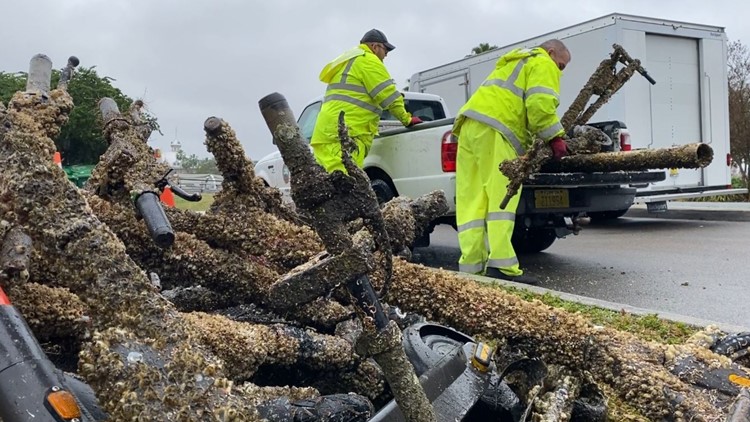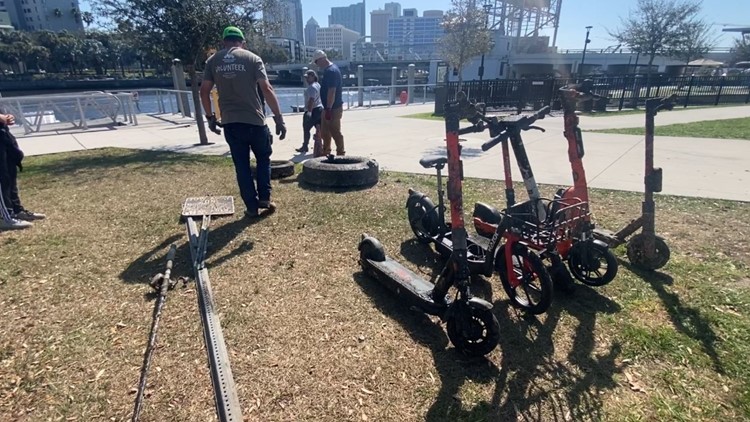Tampa to install e-scooter docks to help prevent them from ending up in Hillsborough River
More than 200 e-scooters have been dumped in the Hillsborough River since Tampa got them in 2019. Now, new contracts with the companies are coming.
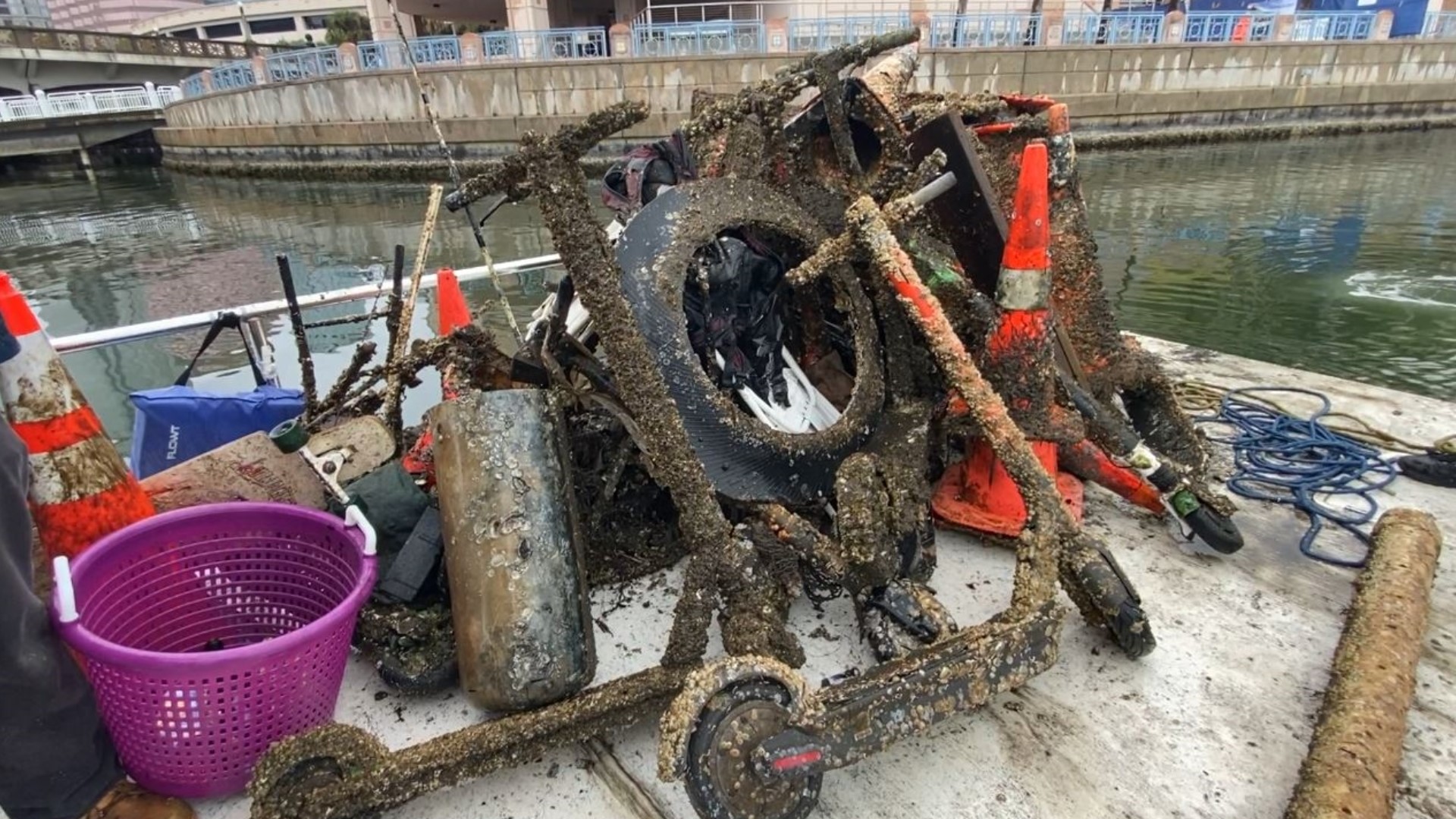
If you've spent any amount of time in downtown Tampa, you've likely seen electric scooters being used to zip through a short commute. The city of Tampa currently has contracts with three e-scooter companies – Bird, Lime and Spin.
"The objective of Tampa’s shared micro-mobility program is to introduce a new, low-cost method of transportation to enhance how people get around and address the “last-mile” needs of Downtown Tampa and surrounding neighborhoods," the city's website reads.
The scooters first came to Tampa in April of 2019. In the four years since their arrival, there has been a consistent problem: people throwing scooters into the Hillsborough River.
The Problem: Scooters in the Hillsborough River Scooters getting tossed in the Hillsborough River has been an ongoing problem since e-scooters came to Tampa.
10 Tampa Bay's Malique Rankin has been covering the efforts to remove e-scooters from the river for more than a year and a half. In that time, more than 200 e-scooters have been removed from the Hillsborough River.
If you're wondering who should be removing those scooters from the river, or anywhere they don't belong – it's the scooter companies.
"So by contract, that would be the responsibility of the scooter vendors themselves," Vik Bhide, the director of mobility for the city of Tampa, explained.
Unfortunately, that isn't what happens the majority of the time.
The e-scooters all have lithium-ion batteries. The longer they soak in the Hillsborough River, the greater the problem they create in damaging our river ecosystems.
Keep Tampa Bay Beautiful is a non-profit organization focused on promoting a culture of environmental stewardship through volunteer and educational opportunities. They work year-round to clean up Tampa Bay. A recent and recurring project they've taken on lately is fishing e-scooters out of the river.
E-scooters being removed from the Hillsborough River
"I'm hoping that there'll be a day that we come out and find nothing," Capt. Al Antolik said. "I'm looking forward to that day."
Antolik is the environmental projects director and trash-free waters manager for Keep Tampa Bay Beautiful. He's also who you'll see behind the wheel of Keep Tampa Bay Beautiful's boat that is used in e-scooter clean-ups.
On board that boat are volunteer divers who enter the murky waters of the Hillsborough River searching for scooters that were tossed over near the riverwalk. Additional volunteers stay above the water's surface to pull aboard the barnacle-covered scooters the divers find.
Antolik manned the boat during Keep Tampa Bay Beautiful's second annual river clean-up event in March of this year. When scooter retrieval efforts began, it was common to see more than 60 scooters removed from the river in a single dive. During the most recent clean-up, 29 e-scooters were removed from the river.
"Well, I actually am glad to see less scooters," Antolik said. "I'm hoping that's a trend that stays that way."
E-scooters being removed from the Hillsborough River
For Keep Tampa Bay Beautiful to remove scooters from the river, they have to foot the bill to make it happen – even though it's the contractual obligation of the scooter companies to remove scooters from areas they don't belong.
When asked for a breakdown of how much each dive costs Keep Tampa Bay Beautiful, the non-profit responded with an estimated $5,000-$15,000 per dive.
"I wasn't aware of the specific costs," Bhide said. "I do know that in the past, the city has worked with Keep Tampa Bay Beautiful and the vendors to do some of these cleanups.
"The degree to which the vendors have participated, we're not aware because we don't direct those efforts. Keep Tampa Bay beautiful does."
The thousands of dollars that go into these dives cover the costs of fuel, dive tanks, dive supplies, ropes, specialty equipment and more. The non-profit has organized and conducted at least six dives for scooters in the past two years.
The money, effort, and time Keep Tampa Bay Beautiful is using could be put towards other environmental efforts in Tampa Bay.
"One of the things I'd like to focus on, personally, would be ecotourism," Antolik explained. "Basically, take folks out and show them the other side of things. When we plant mangroves, what does that turn into, how does that help..."
The history of e-scooters in Tampa The city has extended its pilot program four times since 2019.
Tampa’s Shared Micromobility pilot program became effective for a one-year term on April 23, 2019. Since then, the pilot program contracts have been extended five times.
"On a monthly basis, we see over 80,000 scooter rides, we've had over 3 million scooter rides to date," Bhide, Tampa's director of mobility, said. "So they're clearly a useful mobility option for folks within the city."
Tampa Mayor Jane Castor authorized the reinstatement of the program for one year, declaring a state of emergency related to COVID-19 on March 19, 2020.
Tampa City Council approved another extension on May 20, 2021, which reinstated the program for six months. On Oct. 21, 2021, the pilot program was reinstated by Tampa City Council for an additional one-year term, expiring Oct. 23, 2022, then again for a six-month extension on Oct. 20, 2022, expiring on April 23, 2023.
That brings us to now. There is a pending proposal awaiting Tampa City Council's approval to extend the pilot program for an additional six-month term, until Oct. 23, 2023.
"E-scooters came on US markets, first on the West Coast in 2017," Bhide said. "So they've not been around that long. It's not even been, you know, 10 years... The city adopted its pilot in 2019. The main goal was to understand how these devices interact on our roadways.
"At that time, there are no rules, there was no legislation. And the other [goal] was how can we fill in the gaps for shorter trips, trips that are under three miles in our urban core."
The e-scooters are a part of the city's micro-mobility program. That program is under the mobility department of the city of Tampa. 365 people work for Tampa's Mobility Department, in positions including management of streets, sidewalks, traffic lights and more.
The head of that department is Bhide. He said once the last extension for e-scooter contracts in Tampa expires in October of 2023, the city will adopt new contracts with the e-scooter companies.
"The intention initially was for [the pilot program] to expire within 18 months and move to a new contract," Bhide explained. "We're in the process of working through an ongoing legal matter with BIRD Rides. And once that is settled, we can go through the post-pilot program, which is our phase one."
Scooter companies' responses 10 Tampa Bay's Malique Rankin reached out to all Tampa e-scooter companies.
As we've highlighted, the scooter companies are responsible for removing scooters from areas they don't belong – including the Hillsborough River. The city of Tampa has acknowledged the contractual obligations the companies have in removing scooters from the river.
"When they're aware of scooters that are not in places that they need to be, they have been responsive to us," Bhide, Tampa's director of mobility, said. "Now having said that, the reason we're moving from the pilot [program] to our phase one is the [program] does not have all the rules for us still hold them accountable, or even for them to operate in a manner that is best for everyone."
10 Tampa Bay's Malique Rankin asked all e-scooter companies contracting with the city of Tampa the following questions:
- What has your company done on its own to retrieve these scooters from the river?
- How much have you financially contributed to Keep Tampa Bay Beautiful?
- How much have you contributed to Keep Tampa Bay Beautiful by means of volunteer efforts during clean-ups?
- What changes have you made to prevent scooters from being dumped into the river?
- Does your company feel an obligation to do more in scooter removal from the river, as outlined as a requirement in your contract with the city to remove scooters from areas in which they do not belong?
Here's what each company had to say.
Spin
"We strongly support the efforts of Keep Tampa Bay Beautiful to keep the Hillsborough River clean and retrieve e-scooters that have been discarded by reckless individuals. Spin has financially contributed to these efforts and our team has also retrieved fifteen (15) e-scooters in partnership with Keep Tampa Bay Beautiful. Alongside Keep Tampa Bay Beautiful, we have also trained our local in-house staff to retrieve our e-scooters using grappling hooks and ropes. To date, we have successfully retrieved approximately thirty (30) e-scooters on our own from the Hillsborough River using these methods.
We recognize our responsibility to protect the local environment and prevent individuals from being able to pollute the river with e-scooters in the first place. To this end, we have decided to proactively extend our No Parking geofences to prevent Spin e-scooters from being parked anywhere within 150 feet of the Hillsborough River. Going forward we are committed to partnering with the Keep Tampa Bay Beautiful to address this issue and share the results of our efforts with the City on a monthly basis."
Lime
"We've made great progress on reducing instances of e-scooters in the [Bay] by upgrading to our Gen4 model, instituting no parking zones on all bridges and locations near water. Since we upgraded our fleet in May 2022 our efforts have helped cut these instances down to almost zero, and we'll keep working to improve. We're grateful to Keep Tampa Bay Beautiful and will continue to support them and volunteer with them on cleanups."
Bird
"Bird is deeply committed to the Tampa community, and that includes managing our fleet responsibly through a variety of initiatives. All Bird e-scooters have enhanced GPS technology, as well as an industry-leading protected IP-68 rated battery which, together, protect the environment, the vehicles, and enable us to find and recover vehicles more easily.
In addition, we have participated in efforts to recover vehicles that are lost through both our dedicated Trust & Safety team, as well as joining Keep Tampa Bay Beautiful in their activities. We stand ready to support law enforcement as they investigate and take action on anyone who vandalizes e-scooters. We are proud to be a leader in shared micromobility and are dedicated to providing reliable and sustainable transportation in Tampa."
None of the companies disclosed how much money has been donated to Keep Tampa Bay Beautiful. Only one company – Spin – said it has donated financially to Keep Tampa Bay Beautiful.
In the most recent dive Keep Tampa Bay Beautiful organized in March, no scooter company representatives were present.
"I personally like having reps here," Antolik said. "It shows that they are actually involved and interested in the process that we're out here doing that we're out here collecting them... I'm not sure why we don't have any reps..."
In the dive conducted in February of this year, only one representative was present. Esteban Belez, the marketing manager for Spin Central Florida helped Keep Tampa Bay Beautiful in pulling scooters aboard that divers found in the Hillsborough River.
At the dive on Feb. 17, 10 Tampa Bay's Malique Rankin asked Belez if Spin has donated to Keep Tampa Bay Beautiful to fund these dives.
"No, no, no, actually, we don't have a specific fund for this," Belez said. "But we actually help every time this is happening. We've been helping, probably for the past couple of years, since, I don't know when exactly, what really – 2019. And that's basically our contribution, our hands, our presence, and spreading the word as well."
His answer contradicts the statement provided by Spin's corporate office on March 10. Belez did not attend a clean-up event the following month.
The solution New docking stations will be installed across Tampa.
So, how will the city keep scooters out of the river and any other places they don't belong? Docking stations.
In the fall of 2023, the city of Tampa will enter into "Phase One" of its micro-mobility scooter contracts.
"The difference with that program is we have listened to the community, we've listened to the market as well," Bhide, Tampa's director of mobility, explained. "And we're instituting rules that will create lesser of a hazard with, you know, scooters in the sidewalk, move to a more docked program in our urban core, and just have the deployment to better manage, based on information we've received from the community."
This is something already in effect for e-bikes in Tampa. Renderings of e-scooter e-bike docking stations are shown in the image below, where users must bring the scooter to designated docks before their ride ends.


The docks will do more than give users a gentle nudge to park their e-scooters there – it will be enforced through the app.
"So if they're not parked, the members will initially get warnings and then eventually get fines," Bhide said. "Really the goal is to keep our sidewalks clear and also to allocate space, working with our Vision Zero team of planners and engineers, on our pavements for parking these vehicles.
"As you know, we have a lot of space for on-street parking for cars. We wanted to create more space for scooters and e-bikes, and share that space – limited space – within our right of way with all modes of travel."
Through "Phase One" of the e-scooter contracts, Bhide said the city will be able to better hold the companies accountable for keeping track of their scooters and making it more difficult for riders to place the scooters in concerning areas – like the bottom of a river.
"We believe it will work better, partly because what Phase One does is by having a clear docking location that they're required to dock to," he explained. "If they do not dock, the user of that device gets fined."

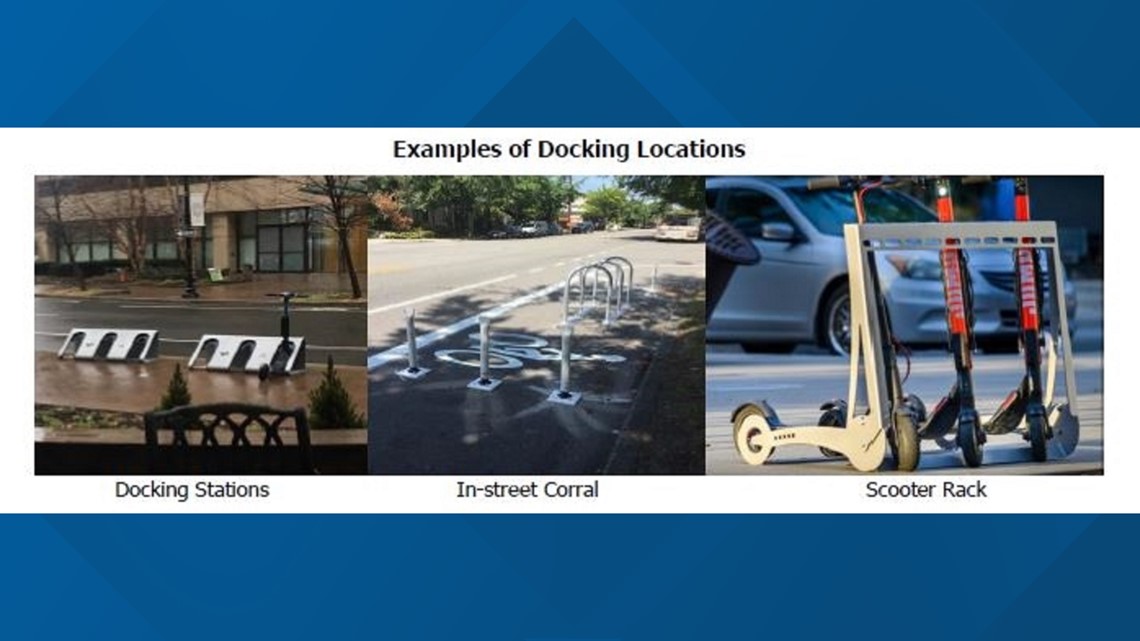
Along with discouraging bad behavior, the apps will soon incentivize good behavior.
"We also have a bounty program defined in our contract, where if another user sees a device not in its place and does the right thing and puts it where it belongs, they get a credit for it," Bhide explained.
The city of Tampa's contract with the scooter companies said, moving forward, all e-scooters will have to be parked in a docking location.
The contract reads, in part, "Operator will actively manage its micro-mobility vehicle fleet to ensure orderly parking in permitted Docking Station-approved parking facilities and the free and unobstructed use of the ROW (right of way) in consultation with the City’s Mobility Department Right-of-Way Management Section (or its successor section)...
"Operator should impose penalties, including out-of-hub fees, and incentives, including bounties, as required by the RFP and specifically set forth in Operator’s proposal..."
Also written in the new contracts, the e-scooter companies are prohibited from allowing rides in the following areas:
- Vehicles shall not be ridden on the sidewalk on 7th Avenue
- Vehicles shall not be ridden on the sidewalk on Bayshore Boulevard
- Vehicles shall not be ridden on Tampa Riverwalk
- Users shall dismount when riding through crowded sidewalks filled with pedestrians
Scooter companies have the option to install docking stations that hold either five or 10 e-scooters per dock.
Locations for the docks will be scattered around the downtown Tampa area, which include:
- In north downtown Tampa, docks will be installed to accommodate 600 scooters.
- In downtown Tampa, docks will be installed to accommodate 800 scooters.
- In west downtown Tampa, docks will be installed to accommodate 600 scooters.
- In Westshore District, docks will be installed to accommodate 800 scooters.
Phase One is expected to launch in the fall of this year, with e-scooter docks installed throughout downtown Tampa in the upcoming months and riders seeing the changes in their apps.
Malique Rankin is a general assignment reporter with 10 Tampa Bay. You can email her story ideas at mrankin@10tampabay.com and follow her Facebook, Twitter, and Instagram pages.


